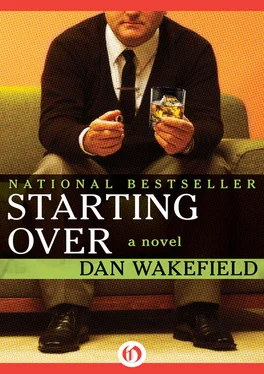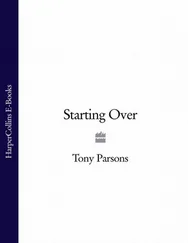“I’ll probably never see you again,” she said calmly when he took her home at dawn after a silent breakfast.
“Don’t be silly,” he said, knowing she was exactly right.
Dean Hardy called and said he would like for Potter to come by and have a little private chat.
Shit! As if it weren’t reckless enough getting involved with a twenty-year-old girl who was suffering the traumas of abortion and acid, Potter had to pick one whose family was a friend of the goddamn Dean of the college where he taught. He figured that’s what Hardy wanted to have a private little chat about. His scandalous affair with the daughter of dear friends of the Hardy family.
As it turned out that was not the subject at all, but the matter the Dean did want to discuss was not a whole lot more comforting to Potter.
“Tell me, Phil,” Dean Hardy said, tamping down his pipe as he and Potter sat in big leather chairs in his study with glasses of brandy, “what are your plans?”
Potter suffered a sort of multiple déjà vu of all the times he had been asked that question, ever since he could remember, by his father, his future father-in-law, his guidance counselor at high school, his troop leader at Boy Scout Camp Guitche-Goo-Mee, his marriage counselor, his acting teachers, the head of the PR firm he had worked for, girls he had slept with on summer vacations, his CO in the Navy. He wondered if the “primal scream” might be traced back to the fact that when a baby came out of the womb a doctor was there to slap it on the ass and say “Tell me, kid, what are your plans?” But now he was thirty-four years old. And still being asked.
He envisioned a future scene after death, finding himself in a neat office being interviewed by a man in a business suit, a man who was puffing a pipe and leafing through a folder marked “Potter, Philip.” The man looked up from the folder and asked pleasantly, “Tell me, Mr. Potter, now that your life is finalized, what are your plans?”
“I don’t mean anything personal of course,” Dean Hardy said, “but career-wise.”
What it all boiled down to was the inevitable ultimatum that Potter knew would eventually come, but not so soon: if he wanted to think beyond another year of teaching he would have to start work on his Ph.D. Potter said he would seriously consider it because he had found his teaching experience so rewarding; he would begin to look into the possibilities of his working toward the degree, and try to have some specific plans in mind that he could report on to the Dean before spring vacation. The Dean expressed his delight and offered his full cooperation.
The idea of going back to school at his age, of listening to lectures and writing papers, of sucking up to professors, of writing an interminable thesis, was about as appealing to Potter as the suggestion that he go into the desert, remove all his clothes, pour honey on his genitals and have himself tied to an anthill.
Back home, Potter got a drink and a notebook. He opened the notebook to an empty page and wrote “Possibilities.” Under that he scrawled—“Teaching—grad work.” He sat for a long time after that, finished his drink, made himself a new one, then took up the notebook again and wrote “PR—Charlie Bray.”
Charlie Bray was a partner in one of the bigger Boston PR firms, a friendly, old-fashioned sort of a guy whom Potter had invited to come and talk to his PR seminar in hopes of pepping it up, getting the students turned on by a successful, practicing PR guy who was right here in Boston. But Charlie didn’t produce the desired effect. He had made a long, rambling talk, building up to a dramatic bit about how hard it was to define Public Relations, but how through his many years’ experience he had come up with an answer, and he was going to reveal it right there, in that classroom. With everyone awaiting a fantastic revelation, a gem of pure insight and shimmering imagination, Bray paused, leaned forward, and as if giving away the secret of the universe, said, “Public Relations is simply this—doing good and telling about it!” Potter thanked him profusely and dismissed the class in order to spare Bray from embarrassing questions or comments. Bray had taken him for a drink at The Statler, and, buoyed by his chance to perform before an audience and unaware that he had bombed, he praised Public Relations education, praised Potter in particular, and said if he ever wanted to get back in the field, back in on the action, there might well be a place for him at Sondheim and Bray. Potter thanked him, and tried to seem grateful, but hadn’t really taken it seriously. Now, faced with the conundrum of his Future again, he wrote down Charlie Bray’s name and then underlined it.
Wearied by his effort at planning for the future he closed the notebook and turned on the Tonight Show. Potter had watched the talk shows so often he had come to feel part of them, as if he were actually an unseen guest just beyond the camera angle. He felt that Johnny and David and Dick were talking to him , Phil Potter, that he was right alongside them in one of those chairs. He didn’t feel he was merely among the great unknown mass audience, but that he was a regular insider who knocked around with Johnny and David and Dick, got drunk with Ed McMahon, and hung out in Vegas with Doc Severinsen. It seemed only right that he finally be interviewed himself, in person, on one of the shows. Best of all, the Tonight Show.
He began to see it. First of all Johnny finishing a commercial and saying to the whole world out there watching, “Would you welcome please, Mr. Phil Potter!” Perhaps Doc Severinsen from his personal knowledge of Potter would have picked the Vanderbilt alma mater song, jazzed up, of course, as the theme for his entry, and Potter, cool and smiling, would emerge through the high curtains, parting them gracefully (he hated to see the guests who fumbled their way through the curtains), and would stride to the platform to shake hands with Johnny and Ed and their other guests of the evening—Zsa Zsa and Gore and Don Rickles and Aretha. The men would smile and shake his hand, Aretha would give him a peck on the cheek, and Zsa Zsa would call him “Phil, dahling” and hit him with a smoldering caress that would have the audience screeching and whistling.
“Phil, it’s good to see you again.” Johnny smiles, tapping his pencil.
“Good to be back, Johnny.”
“Now, Phil, for those of our viewing audience—those very few—who don’t know all about you, could you tell us something about your career?”
“Well, Johnny, as you know, I’m a failure.”
Gasps and giggles from the audience.
“Failure? What does that entail? I don’t think I’ve heard that term recently.”
“Well, Johnny, you’re right in thinking it’s kind of outdated. You see, ‘Failure’ was a popular term in the late Fifties and early Sixties—when I was becoming one.”
Laughter. Camera pans to beautiful girls in the audience who are obviously taken with Potter’s clever wit and can’t wait to mob him when the show is over.
“You see, Johnny,” Potter continues, “the opposite of ‘Failure’ was ‘Success,’ which is now exemplified by someone like, say, President Nixon.”
The audience breaks up.
“When I first realized that I had a knack for being a ‘Failure,’ Johnny, was back when—”
“I’m sorry to interrupt you, Phil, but we have a message from one of our sponsors. Stay tuned, folks, and we’ll be right back to hear about the fascinating career of Phil Potter, an old-fashioned ‘Failure’—and perhaps he’ll tell us something about his plans for the future.…”
Applause.
Alpo.
With Marilyn going to New York every weekend, Potter set out on a series of haphazard sexual adventures, not out of lust so much as loneliness and boredom. He picked up girls wherever he could—sitting in Cambridge coffeehouses, waiting in line at his bank to cash a check, eating a cheeseburger at Brigham’s, waiting for the subway, shopping for records at The Minuteman. He smiled, cajoled, joked, winked, bought them drinks, took them back to his place and put on the ritual records. Once he got them as far as his living room he was pretty sure of getting them from there into bed. On rare occasions, however, the living room was as far as they would go.
Читать дальше












